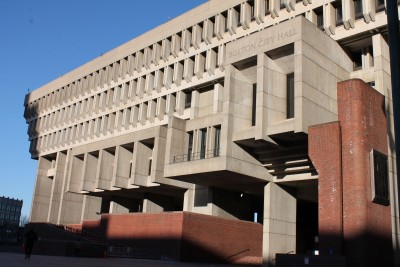
After admitting to an Open Meeting Law violation, the City of Boston’s Law Department announced Tuesday that the Boston City Council will take new measures to ensure that agenda items are accurate and timely, according to a letter from Chief of Government Services Adam Cederbaum.
According to an Open Meeting Law Complaint Form submitted by the Massachusetts Patient Advocacy Alliance, a city clerk replaced a Boston Zoning Code amendment for marijuana dispensaries with the wrong agenda item and failed to notify the public 48 hours before the event. Cederbaum wrote that the violation was unintentional.
“This mistake was a typographical error, apparently caused by copying and pasting the wrong text from another word processor document,” Cederbaum wrote in the letter. “… The mistake was discovered shortly after the agenda was posted.”
Cederbaum wrote in the letter that the meeting in question, scheduled for March 2, was “to petition the Boston Zoning Commission to enact a zoning regulation limiting the proximity of marijuana dispensaries.”
According to Cederbaum’s letter, the MPAA requested that the City Council reschedule the public meeting and have a new vote on the issue with engagement and contribution from the public.
Cederbaum said the MPAA would still be unable to contribute to the decision regarding the Boston Zoning Commission.
“Re-doing the process in an effort to ‘cure’ any Open Meeting Law violation caused by the copying mistake will not provide the MPAA with an opportunity to actively participate or provide public comment,” Cederbaum wrote in the letter. “The Open Meeting Law requires that meetings be open to the public, but it does not require that public bodies conduct public hearings.”
Despite refusing to reschedule the meeting, Cederbaum acknowledged the mistake and proposed action to highlight government transparency and emphasize the accidental nature of the error.
According to Cederbaum’s letter, these measures include delegating an additional staff member at the clerk’s office to review the agenda. Moreover, in relation to MPAA, the City Council will place the advocacy group on the Zoning Commission’s list of contacts to receive notification of Zoning Commission hearings and BRA meetings relating to marijuana dispensaries buffer zones, according to the letter.
Nichole Snow, executive director of the MPAA, and Michael Latulippe, development director of the MPAA, both discussed obstacles they’ve encountered as a humanitarian organization seeking to represent patients across Massachusetts.
“We have been consistently, for the most part, shut out of the discussion,” Snow said. “We go and we represent the patient. A lot of times we’re in the audience, but lately we’re feeling that we’re the ones who need to be at the front of the line talking to these people.”
Latulippe said one of the main obstacles the MPAA has faced is public perception of the group, primarily due to the highly disputed issue of marijuana.
“They’re so cavalier about marijuana laws … They don’t take it seriously,” Latulippe said. “We want to work with the City Council to try to zone multiple [registered marijuana dispensaries] in the City of Boston.”
Several Boston residents said proximity laws for marijuana dispensaries should be similar to those of other retail businesses.
Dennis Berry, 26, of Dorchester, said he values transparency in the decision.
“The legalization shouldn’t be a big deal,” he said. “Too much of anything is bad, but when it comes to it, there has to be a very thorough screening process, no shady character.”
John Pastyrnak, 23, of Brighton, compared Boston to other cities in the nation who have adopted medical marijuana laws.
“It’s so much simpler in California or Colorado because it’s sort of a way of life over there, and I think we’re all moving towards that,” he said. “Not telling the public when they’re holding certain forums is not going to help their situation. Trying to hide it and make a bigger deal of everything is what causes problems.”
Juan Williams, 20, of Roxbury, said councilors should learn from other city governments.
“The government should continue to research and investigate but truly look at other cities and learn from them, both what to do and what not to do,” he said. “Especially in Boston, as we are supposedly a leading city in the country and the world, or at least aiming to be.”














